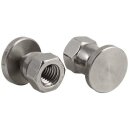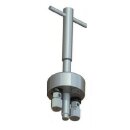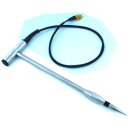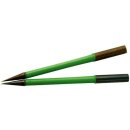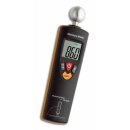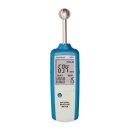Material Moisture
- Accessory for hammer probes for material moisture measurements
- Delivery in pairs
- Teflon insulation
- Lenght: 45mm, Ø2.5mm
Material Moisture Meters
Due to direct water contact, heavy rains and floods, but also extremely high temperatures and drought the moisture in buildings, building materials, timber, hay, straw, food, cereal grains, pharmaceutical products and during construction and production processes can be too high or too low and thus can cause damages and losses. For the measurement of material moisture there are moisture meters available which are based on different measuring principles:
Contact moisture meters for measuring the surface moisture on the principle of the electrical resistance by means of insertion pins.
Contactless moisture meters allow non-destructive measurements to depths up to some centimetres, even below tiles, using a capacitive principle.
Building Materials
Some moisture is unavoidable and may even be necessary in certain building materials, but too much can cause mould, decay and other problems. Our moisture meters are cost-effective instruments that can easily determine moisture levels - allowing the user to diagnose problems and make informed decisions with regard to remedial actions.Moisture in Floors and Walls
Many of today's flooring materials use water-based adhesives, which are more likely to fail than the older, traditional, solvent-based adhesives. Moisture can cause laminates to fail, tiles to lift and hadwood floors to warp or split. An newly poured concrete floor slab is usually the slowest-drying element of a building. Therefore it is important tho measure the moisture content accurately to ensure a successful floor.
Measuring the moisture content of walls is a traditional method for locating damp and other related problems i.e. damaged pipework, breached damp-.proof courses etc. It is important to ascertain the cause of the dampness, i.e. rising damp, penetrating damp or condensation before any remedial action is undertaken.

